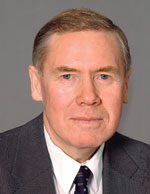 Technology from Europe: Technology from Europe:
Norway/Sweden
NPD’s head man retains optimism about NCS future
Gunnar Berge is director general of the Norwegian Petroleum Directorate (NPD) in Stavanger. His governmental agency provides direct oversight of oil and gas matters, and disseminates information back to other portions of the Norwegian government. In this interview, he discusses some of the issues facing Norway’s upstream industry.
Question: Mr. Berge, please describe NPD’s mission, as it relates to the upstream oil and gas industry.
Answer: NPD does not act on behalf of the industry. Rather, it is a governmental body, giving advice to the Ministry of Oil and Energy on resource matters, and acting on behalf of the Ministry of Labour and Government Administration on topics concerning health, safety and environment. NPD contributes to creation of the highest possible values for society from oil and gas activities. This is founded on sound management of resources, safety and environment.
Q: What is your analysis of last year’s E&P market for Norwegian operators and service companies?
A: There was decreased exploration activity on the Norwegian Continental Shelf (NCS), compared to previous years. We had 19 exploration wells initiated, from which eight new discoveries were made. These finds resulted in new reserves totaling approximately 20 million cu m of oil equivalent (125.8 million boe) This volume amounts to about 10% of the oil and gas produced during 2002.
Total investments on the NCS were NOK 52 billion (US$7.3 billion), which is slightly lower than the year before, while total operating costs add up to NOK 33 billion (US$4.7 billion). Even if these figures are slightly lower than those of previous years, it still indicates a high activity level. However, the rig market has had problems related to the lower drilling activity.
Q: Based on your assessment of last year, what level of activity and business do you expect for 2003?
A: This year, we expect 15 exploration wells to be drilled in the North Sea and the Norwegian Sea. NCS investments are expected to increase to NOK 65 billion (US$9.2 billion), while operating costs should remain at last year’s level.
Q: What are some major projects in the North Sea or other regions that involve Norwegian companies?
A: At the moment, there are eight, ongoing, field development projects. All of these have approved plans for development and operation (PDOs) on the NCS. The biggest ones with regard to resources and investments are Snøhvit, Grane, Kristin and Kvitebjørn. Another major, ongoing project is Ormen Lange field, with a PDO submittance expected during 2003.There are also interesting decommissioning projects going on in the North Sea, particularly at Ekofisk field.
Q: Regarding technology, which projects are good examples of upstream work that involved Norwegian firms?
A: From a technological viewpoint, all the projects mentioned above are challenging. In particular, projects at Ormen Lange, Kristin and Snøhvit fields have many different challenges.
Kristin is a gas/condensate field in the Norwegian Sea. Its reservoir has extremely high temperatures and pressures. This is challenging, not only for the design of subsea equipment and risers, but also for drilling and well maintenance.
Snøhvit is a gas field in the Barents Sea. The field development scheme is a subsea design, with multiphase transport of the unprocessed wellstream to an LNG plant onshore. Main technical challenges are long-distance, multiphase transport and flow assurance.
Ormen Lange is a large gas field in the Norwegian Sea. The main challeng-es are its deep waters (800 to 1,100 m or 2,625 to 3,610 ft), seafloor conditions and flow assurance.
Q: Are there recent, notable E&P projects that focus on important Norwegian-created technology or support capabilities?
A: Most of our technology development (derived from NCS needs) has resulted from collaboration between governmental authorities, Norwegian and foreign E&P firms, and R&D institutions.
Since the early 1990s, Norway has established a strong position with regard to development of subsea equipment (utilization examples are Asgard and Troll fields), advanced wells (Troll, again, is an example) and multiphase transport (examples include Snøhvit and Ormen Lange fields).
Q: Toward which international areas do you think that oil and gas company interest and money are moving?
A: Our task is to promote the NCS. We still believe that there are large amounts of undiscovered oil and gas on the NCS. NPD’s estimates show that ultimate, total recoverable resources on the Norwegian shelf are 13.7 billion cu m of oil equivalent (86.2 billion bbl). We have sold and delivered 26% of this figure. Another 29% are undiscovered resources.
We are encouraged that new companies are seeking opportunities on the NCS. Most firms smaller than what we have been accustomed. These firms have special interests in exploring and exploiting mature areas, as well as emphasizing tail-end production. 
Gunnar Berge is director general of the Norwegian Petroleum Directorate, based in Stavanger, Norway. His governmental career dates to his first election to the Storting (Norway's parliament) in 1969, where he was a member until 1993. He has held numerous key offices during the last 25 years, including parliamentary, executive branch and Labour Party positions. More recent posts include Minister of Finance (1986–1989); deputy chairman of the Standing Committee on Energy and Industry (1989–1990); Labour's parliamentary leader (1990–1992); and Minister of Local Government and Labour, and Minister of Nordic Cooperation (1992–1996). He was appointed to his current post in 1997. A skilled metal worker by trade, he attended Technical College in 1957–1958, as well as the college of the Norwegian Federation of Trade Unions in 1966. Until recently, Mr. Berge was chairman of the Norwegian Nobel Committee, which last December awarded the annual Nobel Peace Prize to former US President Jimmy Carter.
|
|
|

 Technology from Europe:
Technology from Europe:

